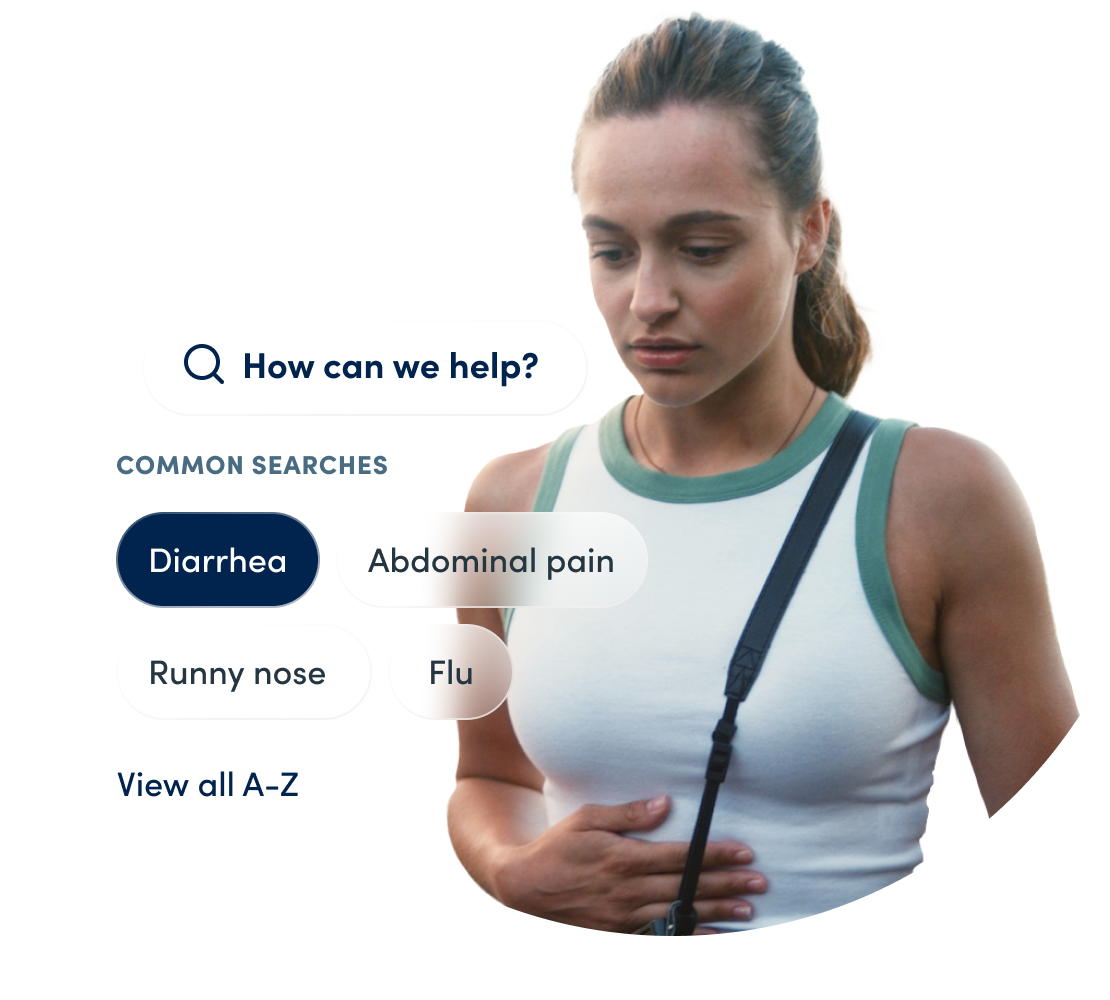GET DIARRHEA TREATMENT ONLINE
Chat with a doctor about diarrhea today. Only $49 for your first month of membership.
• Medical providers available 24/7
• Same-day prescriptions
• No appointment or insurance needed
• Pay $49 for your first month of unlimited visits or $73 for one visit
The benefits of getting treatment with K Health
Instant info
Our smart Symptom Checker brings together data from millions of People Like You to provide you with information–for free.
Care when you need it
Doctors are available 24/7 via text—no appointment or insurance necessary.
Same-day relief
Get medication ASAP and get on with your day. If your symptoms don’t improve, we’re always a text away.
No wasted time
Get the treatment you need without changing your plans. You won’t miss waiting at an urgent care.
LEARN MORE
FAQs

What is diarrhea?
Diarrhea is defined as having three or more loose, watery stools per day. It’s often accompanied by cramping, abdominal pain, urgency, bloating, and gas. Diarrhea can be acute—meaning it comes on suddenly and lasts for a short time—or chronic, which persists for weeks or even months.
Types of diarrhea
There are several ways to describe the different types of diarrhea according to the length of time you experience symptoms and the consistency of your bowel movements.
- Acute diarrhea: This describes diarrhea that lasts less than two weeks.
- Chronic diarrhea: This describes diarrhea that lasts longer than four weeks.
You can also describe diarrhea by its consistency and appearance:
Causes of acute diarrhea
Typically, acute diarrhea goes away on its own within four days. The most common causes of acute diarrhea are often different than the most common causes of chronic diarrhea. The most common causes of acute diarrhea include infections, travelers’ diarrhea, and side effects of medications. Some infections can be foodborne, meaning that they enter your digestive tract through something you eat or drink. Infections that cause diarrhea may include:
- Viral infections: Viruses such as norovirus and rotavirus are common causes of diarrhea.
- Bacterial infections: Bacteria may enter your body through contaminated food or water and cause diarrhea. Common bacterial infections include campylobacter, escherichia coli (E. coli), salmonella, and shigella.
- Parasitic infections: Parasites can also enter your body through something you eat or through contaminated water. Common parasitic infections include cryptosporidium enteritis, entamoeba histolytica, and giardia lamblia.
Traveler’s diarrhea happens when you eat food or drink water contaminated with a bacteria, virus, or parasite. This is more common when traveling to a developing country. This type of diarrhea typically lasts a few days.
Several medications may also cause diarrhea, including:
- Antibiotics
- Antacids
- Medications containing magnesium
- Cancer medications
Causes of chronic diarrhea
Several infections, food allergies, intolerances, digestive conditions or surgeries, and medications can cause chronic diarrhea.
Common food allergies or intolerances that may cause chronic diarrhea include:
- Cow’s milk
- Soy
- Cereal grains
- Eggs
- Seafood
- Lactose intolerance
- Fructose intolerance
- Sugar alcohol intolerance
Digestive tract conditions that may cause chronic diarrhea include:
- Celiac disease
- Crohn’s disease
- Irritable bowel syndrome and other functional GI disorders
- Ulcerative colitis
- Small intestinal bacterial overgrowth (SIBO)
People who have had abdominal surgery in the past sometimes develop chronic diarrhea, including surgeries involving the:
- Appendix
- Large intestine
- Small intestine
- Gallbladder
- Liver
- Pancreas
- Spleen
- Stomach
Some medications may cause chronic diarrhea as a side effect when taken long-term. Taking antibiotics to treat bacterial infections of any kind can alter your normal gut bacteria and allow Clostridium difficile (C. diff) to grow. This bacteria can cause diarrhea and other complications.
Stress is another factor that sometimes causes diarrhea.
Symptoms of diarrhea
If you have diarrhea, you may have an urgent need to use the restroom. You may also experience the following:
- Abdominal cramping or pain
- Bloating
- Intestinal gas
- Nausea
- Loss of bowel control
If you have an infection causing diarrhea, you may also have symptoms such as:
- Blood in your stools
- Fever and chills
- Feeling light-headed or dizzy
- Vomiting
How is diarrhea treated?
To figure out which treatment is best for you, your medical provider will ask you about your recent symptoms. They may question you about the frequency of your bowel movements, how long you’ve been experiencing diarrhea, and the color and consistency of your stools. They’ll also want to know about recent travel, contact with other sick people, and the types of medications you take.
Depending on the suspected cause, your provider may suggest treatment with over-the-counter (OTC) medications to help stop diarrhea. If they think you have an infection, they may order an antibiotic or medication that targets a parasite infection.
For gastrointestinal disorders, some treatments may help stop your diarrhea.
Sometimes, experts suggest probiotics to restore a healthy bacteria balance in your gut.
To treat dehydration caused by diarrhea, drink plenty of fluids and electrolytes. Water is essential, but you should also include other liquids like broth, fruit juices, and sports drinks. These liquids are vital for young children as they contain electrolytes and glucose—a sugar that helps the body absorb and retain fluid.
If you have severe diarrhea and cannot keep liquids down, or if your stool contains blood, you should go to the hospital as you may need intravenous (IV) fluids. People with a weakened immune system are also at risk for more severe problems from diarrhea and should seek medical attention immediately.
What medication treats diarrhea?
OTC anti-motility medications can help stop diarrhea. However, they can be dangerous for children and aren’t recommended for people experiencing bloody stool or signs of infection such as fever. OTC anti-motility medications include loperamide (Imodium) and bismuth subsalicylate (Pepto-Bismol, Kaopectate).
Antibiotics may help with certain infections. Your doctor will order an antibiotic prescription if it is needed. Sometimes, laboratory testing of the stool is needed prior to treatment.
Complications of diarrhea
Diarrhea can cause dehydration and malabsorption, which can be serious.
Symptoms of dehydration include:
- Thirst
- Dry mouth
- Urinating less often than usual
- Dark colored urine
- Feeling tired
- Decreased skin elasticity
- Feeling light-headed or dizzy
- Sunken eyes or cheeks
- No tears when crying
- A sunken soft spot on the skull of infants
Chronic diarrhea lasting for a few days or longer may cause malabsorption. Symptoms of malabsorption include:
- Stomach bloating
- Changes in appetite
- Having extra gas
- Passing loose, greasy, or foul-smelling stools
- Weight loss
- Poor weight gain in infants
See a medical provider you trust
-
Our licensed providers were trained at top-tier medical institutions
-
They use advanced health AI technology to provide you with personalized care
-
And they’re available 24/7, just a text away

Frequently asked questions
Do you provide doctor’s notes and sick notes?
During a visit, K Health-affiliated medical providers can only provide a note stating the date when they saw you and that care was provided.
Recommended content
All articles





